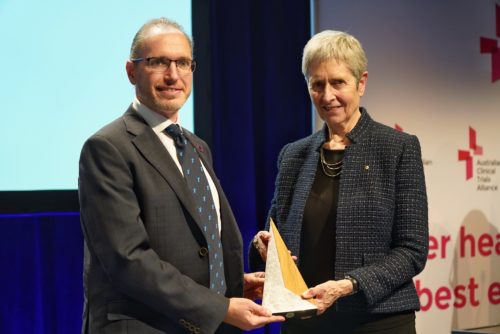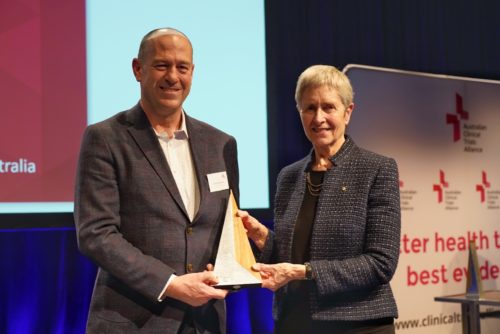The Australian Clinical Trials Alliance (ACTA) is pleased to announce dual winners of their preeminent 2021 ACTA Trial of the Year Award. This event celebrates the vital role trials have in advancing clinical practice and saving or improving patients' lives every year.
The dual winners of the 2021 Trial of the Year Award are:
ProPSMA clinical trial provides greater accuracy in identifying prostate cancer

Prostate cancer is recognised as a silent disease in that there are often no symptoms present during the early stages. Once symptoms do begin to develop, the cancer is often further advanced and may have spread beyond the original tumour site. Imaging accuracy is critical to determining the best treatment plan for men who have received a prostate cancer diagnosis.
The award-winning trial, led by Chief Investigator, Prof Michael Hofman, Director of the Prostate Cancer Theranostics and Imaging Centre of Excellence (ProsTIC) at the Peter MacCallum Cancer Centre (as part of the Australasian Radiopharmaceutical Network (ARTnet) and co-badged the ANZUP Cancer Trials Group), uses a new imaging technique called PSMA PET/CT which can detect small sites of tumour spread that may not be detected with conventional imaging.
During the award-winning trial, 300 men with newly diagnosed prostate cancer participated across ten sites. Each participant had a whole-body 3D scan using a radioactive substance that detects a molecule called prostate specific membrane antigen (PSMA), which is readily found on the surface of prostate cancer cells. This was then followed by a PET/CT scan that produced detailed images of the cancer spread. The trial team found that PSMA PET/CT had an accuracy of 92% compared to 65% accuracy achieved with conventional imaging. The findings were published in the peer-reviewed journal, The Lancet, in March 2020. ProPSMA was funded by a clinical trials grant from the Prostate Cancer Foundation of Australia and Movember.
Prof Hofman shared that the trial has already established a new standard of care for the assessment of men with prostate cancer.
“The results are being included in national and international clinical guidelines, and Ga-68 PSMA has also been approved by the US Food and Drug Administration,” he added.
Pneumothorax clinical trial finds a ‘watch and wait’ approach is best to treat a collapsed lung

It is estimated that up to 3,000 Australians present to emergency departments each year experiencing a collapsed lung, or pneumothorax. This condition can be caused by an underlying lung disease or, more commonly, for no obvious reason at all. It occurs when a spontaneous leak from the surface of the lung causes air to collect inside the chest, which in turn causes severe pain and breathing difficulties. For decades, standard hospital treatment for a pneumothorax has been interventional, with doctors inserting a plastic tube into the patient’s chest to drain the collected air to help the lung reinflate. Not only is this treatment often painful, but it can also lead to organ injury, bleeding, infection and sometimes additional surgery if the air leak continues.
The award-winning trial, led by Chief Investigator Prof Simon Brown from the Centre for Clinical Research in Emergency Medicine at Royal Perth Hospital, found that taking a conservative or ‘hands-off’ approach, rather than traditional intervention, had significantly better outcomes for patients.
Prof Brown describes, “We’ve been putting tubes into people with collapsed lungs since the beginning of the 20th century, thinking we were doing our best to treat the condition”.
“Now, this study makes it clear that conservative treatment is the best approach, even when the lung collapse is large,” he said.
316 patients participated in the trial, which was conducted by more than 100 clinical researchers in 39 hospitals. Of those 316 patients, 154 received standard interventional lung drainage management, while the remaining 162 were managed conservatively with pain killers and observation alone. The results showed that 85% of the latter conservative group’s outcome were ‘non-inferior’ to the interventional group in terms of the pneumothorax resolving within an eight-week timeframe. The conservative approach also resulted in a significantly lower risk of complications.
Professor Brown said, “Patients can be sent home to recover and get back to work and their daily lives sooner; avoiding all the complications that go along with inserting a chest tube such as infections, bleeding and reoccurrence”.
The findings are expected to cause a significant shift in thinking around how doctors treat pneumothorax worldwide.
Professor Diana Egerton-Warburton OAM an Emergency Physician and researcher on the trial from Monash Health said “It’s very exciting to see the rapid uptake of this study by The Therapeutic Guidelines (An independent national organisation proving therapeutic information to clinicians to help them make the best decisions for their patients) who now recommend conservative management in the first instance independent of size of the primary spontaneous pneumothorax.”
The findings are expected to cause a major shift in thinking around how doctors treat pneumothorax worldwide.
Professor Egerton-Warburton said, “We really want to use this award now to encourage clinicians to have conversations with their parents on how we can manage this common condition, which often occurs in young people.” She reiterated that it was, and is, a team approach.
“This was a great example of multidisciplinary research, with a number of teams (emergency medicine, respiratory medicine, cardiothoracic surgery, and clinical trials research staff) working together to get a fantastic result for patients.”
ACTA Board Chair, Prof John Zalcberg OAM, said, “The ProPSMA and Pneumothorax trials are incredible examples of the exceptionally high calibre of trials currently being led by Australia’s clinical researchers”.
He added, “Our role at ACTA is to bring together those who are involved in the nation’s investigator-led clinical trials, and these Awards are a way to celebrate and recognise their extraordinary efforts for better patient outcomes”.
“These teams have made a direct and significant impact for patients, and their findings have the potential to be replicated in healthcare settings across the world,” said Prof Zalcberg.
ACTA CEO, Simone Yendle added, “The spotlight is firmly on clinical trials across the world right now, and there has never been a more relevant time to celebrate the breadth and quality of trials underway in Australia.”
‘We are incredibly proud to be able to showcase and share the tremendous efforts being undertaken in Australia’s healthcare system that are creating real changes to patient care,” said Simone.
Full detail on the awards, winners and finalists can be found here: Clinical Trial 2021: National Tribute and Award Ceremony
Download the Media Release here:

